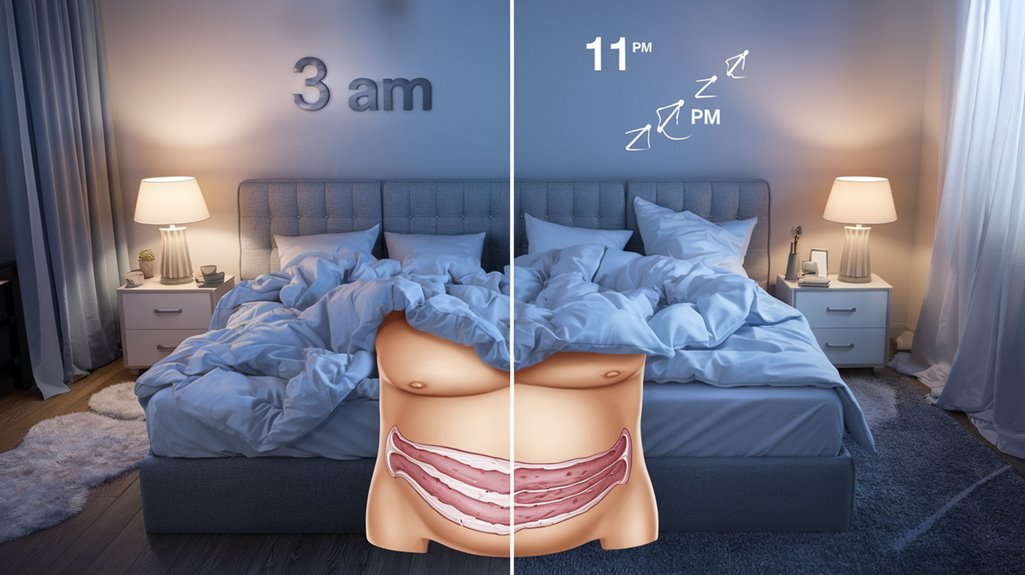Learn how proper sleep patterns can dramatically impact belly fat storage and discover the surprising science behind this crucial connection.

Your sleep habits directly affect how your body stores belly fat. Research shows that poor sleep increases abdominal fat by 9% and dangerous visceral fat by 11%. When you don't get enough sleep, you'll likely consume an extra 385 calories daily and experience hormonal changes that promote fat storage around your midsection. Maintaining 7-8 hours of quality sleep each night is essential for preventing excess belly fat – and there's compelling evidence to show you why.
While many people focus on diet and exercise to reduce belly fat, research reveals an essential but often overlooked factor: sleep duration. When you don't get enough sleep, you'll experience a 9% increase in total abdominal fat area and an 11% increase in visceral fat, the dangerous kind that surrounds your organs. A recent Mayo Clinic study demonstrated that catch-up sleep failed to reverse the visceral fat gains.
You're likely to consume over 300 extra calories daily when you're sleep-deprived, yet your energy expenditure stays mostly unchanged. What's particularly concerning is that lack of sleep redirects fat storage to the visceral compartment rather than the less harmful subcutaneous layer. This process continues even during recovery sleep periods, suggesting that poor sleep actively triggers visceral fat deposition.
The good news is that you can help prevent this fat accumulation by getting adequate sleep. Research shows the benefits plateau at 8 hours per day, so there's no need to oversleep. However, consistently getting less than this amount puts you at risk for increased belly fat.
Your body's ability to burn fat depends heavily on getting enough quality sleep, as sleep deprivation disrupts the hormones ghrelin and leptin that control your hunger and fullness signals. When you're sleep-deprived, you'll likely consume more calories while your body simultaneously redirects fat storage to your belly area, leading to increased visceral fat. You can break this pattern by prioritizing 7-8 hours of sleep each night, which helps maintain proper hormonal balance and reduces the likelihood of excess belly fat accumulation. Poor sleep quality and stress create a vicious cycle effect, making it harder to manage both your weight and stress levels effectively.
When sleep patterns become disrupted, your body's metabolism undergoes significant changes that can promote belly fat accumulation. Your insulin sensitivity decreases, making it harder for your body to process glucose effectively. Research shows that insulin levels spike particularly after evening meals during periods of sleep deprivation. You'll notice changes in hunger hormones too – ghrelin levels increase while leptin decreases, leading you to eat more and feel less satisfied.
What's particularly concerning is how lack of sleep redirects fat storage to your visceral area, the dangerous belly fat linked to metabolic and cardiac diseases. While you might think catching up on sleep on weekends can fix this, these metabolic shifts don't fully recover with short-term solutions. You'll need consistent, quality sleep – more than six hours nightly – to maintain healthy glucose metabolism and prevent harmful fat redistribution.
Understanding how sleep affects fat storage patterns reveals a critical connection between rest and body composition. When you don't get enough sleep, your body redirects fat storage to dangerous visceral compartments inside your abdomen rather than beneath your skin.
Studies show that insufficient sleep increases total abdominal fat by 9% and visceral fat by 11%. Unlike subcutaneous fat, visceral fat has no beneficial qualities and strongly correlates with metabolic and cardiac diseases. What's particularly concerning is that even if you try to make up for lost sleep with short-term recovery periods, the visceral fat accumulation doesn't reverse. Your hormones, including ghrelin and leptin, become disrupted during sleep deprivation, leading to increased fat storage and compromised metabolic function. The disruption of circadian rhythm during poor sleep significantly impacts these metabolic processes, making weight management even more challenging.
The intricate relationship between sleep and belly fat reveals how getting proper rest directly influences your body's fat distribution patterns. When you don't get enough sleep, your body's hormonal balance shifts, causing increased ghrelin and decreased leptin levels, which drives overeating and fat storage. A recent Mayo Clinic study showed that inadequate sleep duration leads to a significant 9% increase in total abdominal fat area.
| Sleep Effects | Body Response |
|---|---|
| Poor Sleep | Increased Ghrelin |
| Good Sleep | Balanced Leptin |
| Sleep Loss | 11% More Visceral Fat |
| Regular Sleep | Better Fat Distribution |
| Recovery Sleep | Limited Fat Reversal |
You can't easily undo the damage of sleep deprivation, as research shows that even catch-up sleep doesn't immediately reverse visceral fat accumulation. Each night of inadequate rest contributes to a growing pattern of belly fat storage, potentially leading to long-term metabolic and cardiovascular issues. To maintain a healthy weight and fat distribution, prioritizing consistent, quality sleep is essential.

When you don't get enough sleep, your body markedly alters how it stores fat, leading to an 11% increase in dangerous visceral fat around your organs. Your metabolism shifts to store more fat in your abdominal cavity, even if you're young and healthy, with research showing a 9% increase in total abdominal fat area during sleep deprivation. What's particularly concerning is that this visceral fat accumulation continues even during recovery sleep, suggesting that poor sleep triggers a lasting change in how your body distributes fat. Sleep-deprived individuals consume approximately 308 additional calories daily, further contributing to weight gain and fat accumulation.
Research reveals that sleep deprivation dramatically alters how your body stores fat, shifting fat accumulation toward more dangerous visceral deposits deep within the abdomen. When you're well-rested, your body typically stores excess fat under your skin. However, poor sleep redirects this storage pattern, leading to a 9% increase in total abdominal fat and an 11% increase in visceral fat specifically.
You won't notice these changes through standard measurements like weight or BMI – they're only detectable through CT scans. What's particularly concerning is that this visceral fat continues to accumulate even after you've caught up on sleep. The participants consumed an average of 308 extra calories daily when sleep-deprived, contributing to their fat gain. The health implications are significant, as visceral fat surrounds your internal organs and is strongly associated with cardiac and metabolic diseases.
Sleep deprivation profoundly disrupts your body's metabolic processes, triggering a cascade of hormonal changes that affect how fat is stored and distributed. When you don't get enough sleep, your body experiences significant metabolic shifts that promote belly fat accumulation. Adults need seven to nine hours of quality sleep each night to maintain proper metabolic function.
These metabolic disruptions create a perfect storm for increased belly fat accumulation, particularly in the dangerous visceral area around your organs.
Understanding the complex relationship between sleep and metabolism reveals an essential biological connection that affects your body's fat storage and distribution. When you don't get enough sleep, your body experiences significant metabolic disruptions that directly influence how you store fat, particularly in the abdominal area.
Your metabolism responds to sleep deprivation by becoming less efficient at processing insulin, leading to insulin resistance and potential diabetes risk. You'll notice changes in your hunger hormones – ghrelin increases while leptin decreases – making you more likely to overeat and crave high-calorie foods. What's particularly concerning is how lack of sleep redirects fat storage to your visceral compartment, increasing abdominal fat by up to 11%. Studies show that sleep-deprived individuals consume an additional 300+ calories daily.
The good news is that improving your sleep habits can help reverse these effects. Getting more than six hours of sleep per night enhances insulin sensitivity and helps regulate your body's metabolic processes more effectively.

A groundbreaking study involving 12 healthy volunteers has revealed alarming connections between insufficient sleep and visceral fat accumulation. When participants were restricted to just 4 hours of sleep per night, they consumed over 300 extra calories daily compared to those who got 9 hours of sleep. Dr. Harold Bays emphasizes that clinicians must consider sleep disorder evaluations when addressing visceral fat issues.
Key findings from the CT scan analysis show:
You might not notice these changes by simply stepping on a scale, as the weight gain was relatively modest. What's particularly concerning is that the visceral fat continued to accumulate even after participants returned to normal sleep patterns. This suggests that chronic sleep deprivation could lead to progressive fat buildup over years, potentially contributing to cardiovascular and metabolic diseases. Traditional health assessments often miss these hidden changes, making adequate sleep essential for maintaining metabolic health.
When your body lacks adequate sleep, it triggers a significant increase in daily caloric consumption, with research showing an average uptick of 385 calories per day – equivalent to four and a half slices of bread. This increase doesn't come with higher energy expenditure, leading to a net energy gain that promotes weight gain over time.
You'll notice changes in your eating patterns too. Sleep deprivation shifts your food choices toward higher-fat options while reducing protein intake, though carbohydrate consumption typically stays the same. The science behind this involves your hunger hormones: lack of sleep increases ghrelin (which makes you hungry) and decreases leptin (which signals fullness). A recent study conducted in real-world settings allowed participants to maintain their normal lifestyles while tracking their sleep patterns.
The good news? You can reverse these effects. By extending your sleep by just 1.2 hours, you'll likely reduce your daily calorie intake by 270 calories – enough to potentially lose nine pounds over a year.

Taking control of sleep-related fat gain requires implementing specific lifestyle changes that target both sleep quality and metabolic health. You'll need to focus on creating an ideal sleep environment and maintaining consistent habits that support your body's natural rhythms. Appetite-regulating hormones become unbalanced when sleep quality suffers, leading to increased hunger and cravings for unhealthy foods.
Your sleep habits directly influence where your body stores fat, particularly around your midsection. Research shows that getting less than 6 hours of sleep per night increases visceral fat accumulation by up to 32% compared to those who sleep 7-9 hours. By prioritizing consistent, quality sleep, you'll better regulate hunger hormones, reduce stress-related fat storage, and maintain a healthier metabolic rate.